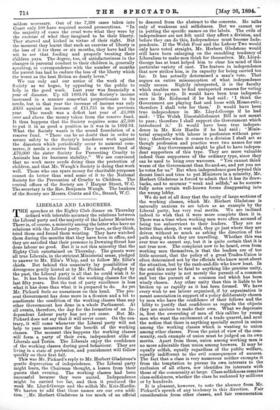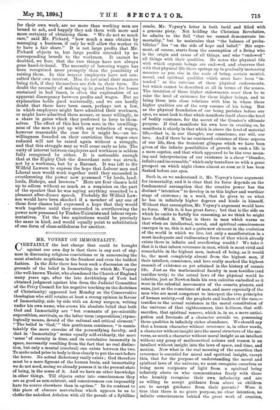LIBERALS AND LABOURERS.
speeches at the Eighty Club dinner on Thursday Tdefined with tolerable accuracy the relations between the Liberal party and the majority of the Labour Members. There is, of course, a minority among the latter who have no relations with the Liberal party. They have, as they think, tried them and found them wanting. They have watched them during the months that they have been in office, and they are satisfied that their presence in Downing Street has done labour no good. But it is not this minority that the Eighty Club entertained on Thursday. The guests were all true Liberals, in the strictest Ministerial sense, pledged to answer to Mr. Ellis's Whip, and to follow Mr. Ellis's chiefs. But behind this unanimity lay possibilities of divergence gently hinted at by Mr. Pickard. Judged by the past, the Liberal party is all that he could wish it to be. It has been the friend of the working classes for the last fifty years. But the test of party excellence is less what it has done than what it is prepared to do. As yet Mr. Pickard feels no uneasiness on this head. The pre- sent Government has done more in a Session and a bit to ameliorate the condition of the working classes than any other Government has done in a whole Parliament. At all events, therefore, the day for the formation of an In- dependent Labour party has not yet come. But Mr. Pickard does not say that it will never come. On the con- trary, it will come whenever the Liberal party will not help to pass measures for the benefit of the working classes. The moment this happens the working classes will form a party of their own, independent alike of Liberals and Tories. The Liberals enjoy the confidence of the working classes during good behaviour. They are living in a state of probation, and punishment will follow quickly on their first fall.
This was Mr. Pickard's reply to Mr. Herbert Gladstone's gentle deprecation of independence. The Liberal party might learn, the Chairman thought, a lesson from their guests that evening. The working classes had been successful because they were united. Independence might be carried too far, and then it produced the weak Mr. Lloyd-George and the selfish Mr. Keir-Hardie. We hasten to add that these names are our own addi- tion. iMr. Herbert Gladstone is too much of an official to descend from the abstract to the concrete. He talks only of weakness and selfishness. But we cannot err in putting the specific names on the labels. The evils of independence are not felt until they affect a division, and before they can do this, Independence must become Inde- pendents. If the Welsh Four and the Labour Two would only have voted straight, Mr. Herbert Gladstone would still have been enlarging on the ennobling tendency of Liberalism to make men think for themselves. Mr. Lloyd- George has at least helped him to clear his mind of this particular variety of cant. The feature in independence that now strikes him, is its capacity for being carried too far. It has actually determined a man's vote. That argues an entire misconception of what independence really means. Rightly interpreted, it is the faculty which enables men to find unexpected reasons for voting with their party. It would have been true independ- ence in Mr. Redmond if he had said : I think the Government are playing fast and loose with Home-rule ; therefore I shall vote for them.' It would have been true independence in Mr. Lloyd-George if he had said : The Welsh Disestablishment Bill is not meant to pass ; therefore I shall support the Government which introduced it.' It would have been true indepen- dence in Mr. Keir Hardie if he had said sympathy with labour is profession without prac- tice; therefore when it comes to a division I shall act as though profession and practice were two names for one thing.' Any Government might be glad to have indepen- dent supporters of this type. They are more valuable indeed than supporters of the ordinary type, since they can be used to bring over waverers. "You cannot think worse of the Government than So-and-so, and yet you see he votes for us." But when independence goes beyond this decent limit and tries to put Ministers in a minority, Mr. Herbert Gladstone is forced to admit that it has its draw- backs, and to murmur "weak and selfish," as he sorrow- fully notes certain well-known forms disappearing into the wrong lobby. We do not at all deny that the unity of large sections of the working classes, which Mr. Herbert Gladstone is naturally anxious to see taken as an example by the Liberal party, has very real merits. We are inclined indeed to wish that it were more complete than it is. There was a time when working men were often accused of being too subservient to their leaders. They are no better than sheep, it was said, they go just where they are driven without so much as asking the direction of the path along which they are travelling. Whether this was ever true we cannot say, but it is quite certain that it is not true now. The complaint now to be heard, even from working men themselves, is that the leaders are of too little account, that the policy of a great Trades-Union is often determined not by the officials who know most about the situation, but by the rank-and-file who know least. In the end this must be fatal to anything like genuine unity, for genuine unity is not merely the pursuit of a common end but the pursuit of a common end which has been wisely chosen. Any other unity than this is liable to be broken up as rapidly as it has been formed. We have every wish to see labour organised, if by organisation is meant association in support of a policy deliberately chosen by men who have the confidence of their fellows and the bility to justify that confidence as regards the objects they are anxious to make their own. What we deprecate is, first the overruling of men of this calibre by young men who want the excitement of a trade quarrel, and next the notion that there is anything specially sacred in union among the working classes which is wanting to union among other classes. From the point of view of the com- munity, each example of union must be judged on its own merits. Apart from these, union among working men is no more admirable than union among brewers. It may be equally selfish, equally regardless of the public welfare, equally indifferent to the evil consequences of success. The fact that a class is very numerous neither exempts it from the temptation to pursue its own interests to the exclusion of all others, nor identifies its interests with those of the community at large. Class-selfishness remains class-selfishness, whether the class be reckoned by millions or by hundreds. It is pleasant, however, to note the absence from Mr. Pickard.'s speech of any tendency in this direction. Fair consideration from other classes, and fair remuneration
for their own work, are no more than working men are bound to ask, and happily they ask them with more and more certainty of obtaining them. "We do not so much care," said Mr. Pickard, "how much a man obtains by managing a business, if only he will allow the worker to to have a fair share." It is not large profits that Mr. Pickard objects to, but large profits attended by no corresponding benefit to the workman. It cannot be doubted, we fear, that the two things have not always gone hand-in-hand. The necessity of lowering wages has been recognised more promptly than the possibility of raising them. In this respect employers have not con- sulted their own interest. Men do not mind their masters being rich, if they themselves are rich in their turn. No doubt the necessity of making up in good times for losses sustained in bad times, is often the explanation of an apparent discrepancy between profits and wages. But no explanation holds good universally, and we can hardly doubt that there have been cases, perhaps not a few, in which employers might have admitted their workmen, or might have admitted them sooner, or more willingly, to a share in gains which they preferred to keep to them- selves. The effect of this has been seen in the unwilling- ness of the men to put up with any reduction of wages, however reasonable the case for it might be,—an un- willingness founded on their conviction that wages once reduced will not be raised again without a struggle, and that this struggle may as well come early as late. The unity of interest between employers and workmen is seldom fully recognised by either. It is noticeable enough that at the Eighty Club the discordant note was struck, not by a workman, but by a Baronet. It was left to Sir Wilfrid Lawson to express the hope that Labour men and Liberal men would work together until they succeeded in overthrowing the power now possessed "by lords, land- lords, Bishops, and brewers." Here are four classes held up to odium without so much as a suspicion on the part of the speaker that he was saying anything unsuited to a pleasant after-dinner speech. Probably Sir Wilf rid Law- son would. have been shockei if a member of any one of these four classes had expressed a hope that they would work together until they succeeded in overthrowing the power now possessed by Trades-Unionists and labour repre- sentatives. Yet the two aspirations would be precisely the same in kind, and would equally point to substitution of one form of class-selfishness for another.



































 Previous page
Previous page